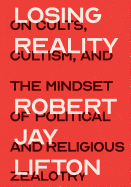
Preeminent psychiatrist Robert Jay Lifton has spent much of his long professional life studying extremes of human behavior. In Losing Reality, he revisits that material through an assortment of subjects--among them Chinese thought reform in the era of Mao Zedong, the Japanese terrorist cult Aum Shinrikyō and Nazi doctors--and updating it with fresh commentary on this unfortunately timely topic.
Grouping these manifestations of "ideological totalism and cultlike behavior" under the label "cultism," Lifton (Witness to an Extreme Century) singles out the "particularly dangerous proclivity of the human mind for extremism." Though that tendency manifested itself in different ways in the massive and deadly project that was Mao's Great Proletarian Cultural Revolution (1966-1976), and in the apocalyptic vision of Aum Shinrikyō's leader Shōkō Asahara, who masterminded a deadly sarin nerve gas attack on the Tokyo subway system in 1995, Lifton makes a persuasive case that the underlying impulses of these gurulike leaders and their enraptured followers were frighteningly similar. For all the depravity reflected in these accounts, the most controversial section of Losing Reality may be the brief one on Donald Trump, whose "cultism," Lifton argues, is "inseparable from his solipsistic reality."
As one would hope from a capable physician, Lifton offers at least a tentative remedy. Drawing on a piece first published in 1993, he points to the need to develop the "protean self," what he calls "a view of the self as always in process... resilient rather than fixed." Given the dire consequences of the zealots' ideologies chronicled in his book, it's fair to ask whether there's any other rational choice. --Harvey Freedenberg, freelance reviewer

